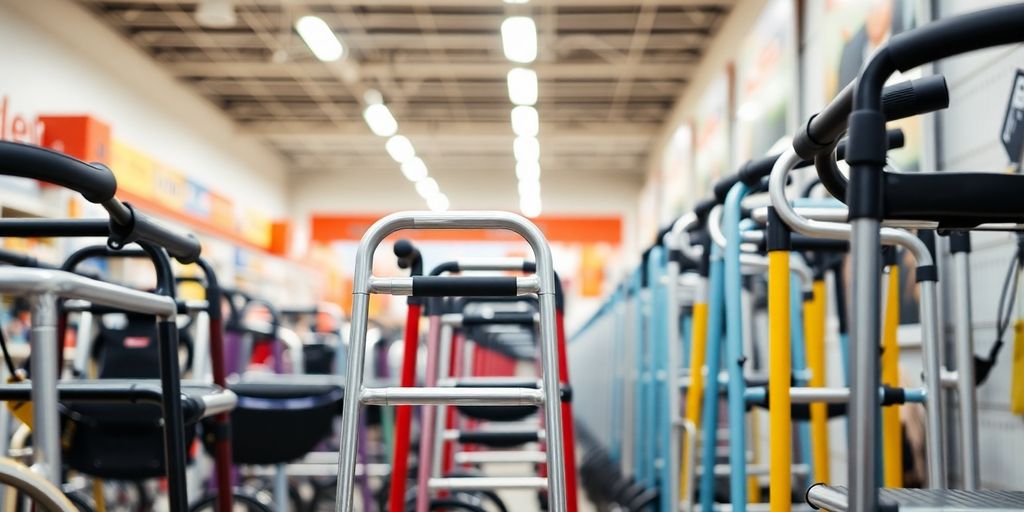Finding the right walker for elderly individuals can greatly enhance their mobility and independence. With various options available, it’s essential to understand the types of walkers, where to purchase them, and what factors to consider to ensure safety and comfort. This guide will help you navigate the choices and make an informed decision.
- Where Can I Sell Gold Near Me? Discover Local Buyers and Top Tips for Selling!
- Where Can I Buy Kerosene Near Me: A Comprehensive Guide to Local Suppliers
- Discover the Perfect Couple Park Near Me: Romantic Getaways and Activities
- Where Can I Buy a Vape Near Me? Discover the Best Local Options!
- Discover the Best Clothes Mall Near Me: A Guide to Greenville’s Top Shopping Destinations
Key Takeaways
- Different types of walkers include standard, two-wheeled, four-wheeled, and knee walkers, each serving specific needs.
- Local retailers such as medical supply stores, pharmacies, and specialty mobility stores offer a range of walker options.
- Consider factors like height, weight, mobility level, and intended use when choosing a walker.
- Consulting healthcare professionals can provide valuable insights into selecting the right walker for individual needs.
- Walkers enhance mobility, safety, and independence, making them essential tools for many seniors.
Understanding Different Types of Walkers
When it comes to mobility aids, walkers are essential tools that help individuals maintain their independence and stability. There are several types of walkers available, each designed to meet different needs:
You are viewing: Where to Buy a Walker for Elderly Near Me: A Comprehensive Guide to Local Options
Standard Walkers
Standard walkers are the most basic type, featuring four legs with rubber tips for grip. They provide a stable base but must be lifted to move forward. This type is ideal for those who need maximum support.
Two-Wheeled Walkers
These walkers have wheels on the front two legs, making them easier to push. They are suitable for individuals who require some support but can bear weight on their legs. This type allows for smoother movement compared to standard walkers.
Four-Wheeled Walkers
Also known as rollators, these walkers come with wheels on all four legs. They are perfect for those who can walk but need assistance with balance. Many models include features like a seat and storage, making them versatile for various activities.
Knee Walkers
Knee walkers are designed for individuals recovering from foot or ankle injuries. They have a platform for resting the knee and allow users to move around using their good leg. This type is particularly useful for those who cannot put weight on one leg.
| Type of Walker | Key Features | Best For |
|---|---|---|
| Standard Walker | Four legs, must be lifted | Maximum support |
| Two-Wheeled Walker | Wheels on front, easier to push | Some support, weight-bearing |
| Four-Wheeled Walker | Wheels on all legs, often includes a seat | Balance assistance |
| Knee Walker | Knee platform, propels with good leg | Foot or ankle injury recovery |


Choosing the right walker can significantly improve your mobility and safety. Consider your specific needs and consult with a healthcare professional if unsure.
Top Local Retailers for Walkers
When looking for a walker, knowing where to shop locally can make a big difference. Here are some great options to consider:
Medical Supply Stores
- Specialized Equipment: These stores often have a wide range of walkers, including four-wheel rollators that come with a padded backrest.
- Expert Staff: Staff members are usually knowledgeable and can help you find the right walker for your needs.
- Customization Options: Many stores offer adjustable walkers to fit your height and mobility level.
Pharmacies with Mobility Aids
- Convenient Locations: Many local pharmacies carry basic walkers and mobility aids.
- Affordable Prices: You can often find budget-friendly options here.
- Quick Access: If you need a walker quickly, pharmacies are usually open late and on weekends.
Big Box Retailers
- Variety of Choices: Stores like Walmart or Target often have a selection of walkers at competitive prices.
- Online Availability: You can check their websites for availability before heading out.
- Return Policies: These retailers usually have flexible return policies if the walker doesn’t meet your needs.
Specialty Mobility Stores
- Wide Range of Products: These stores focus on mobility aids and often have unique options not found elsewhere.
- Personalized Service: Staff can provide tailored advice based on your specific requirements.
- Test Walkers: Many specialty stores allow you to try out walkers before buying, ensuring you find the perfect fit.
Finding the right walker can greatly improve your mobility and independence. Take your time to explore different options and consult with professionals if needed.
Factors to Consider When Choosing a Walker
When selecting a walker for an elderly person, there are several important factors to keep in mind to ensure it meets their needs and preferences. Choosing the right walker can greatly enhance mobility and safety.
Height and Weight
- Adjustable Height: Look for walkers that can be adjusted to fit the user’s height comfortably.
- Weight Capacity: Ensure the walker can support the user’s weight, plus any additional items they may carry.
- Sturdy Frame: A strong frame is essential for stability and safety.
Mobility Level
- Basic vs. Advanced Features: Determine if a simple walker is enough or if features like hand brakes or a seat are necessary.
- User’s Strength: Consider the user’s grip strength and overall physical condition when choosing features.
- Independence: A walker should promote independence, allowing the user to move around safely.
Indoor vs. Outdoor Use
- Terrain Considerations: Will the walker be used mostly indoors or outdoors? This affects the type of wheels needed.
- Maneuverability: For indoor use, a walker that can easily navigate tight spaces is ideal.
- Durability: Outdoor walkers should be made from materials that can withstand various weather conditions.
Safety Features
- Brakes: Hand brakes can provide extra control, especially on slopes or uneven surfaces.
- Anti-Slip Tips: Look for walkers with rubber tips to prevent slipping on smooth floors.
- Wide Base: A wider base can enhance stability and reduce the risk of tipping over.
By considering these factors, you can help ensure that the walker chosen will provide the necessary support and safety for the user. Remember, every individual’s needs are different, so take the time to assess what will work best for them.
Consulting Healthcare Professionals
When considering a walker, it’s essential to consult healthcare professionals. They can provide valuable insights tailored to your specific needs. Here are some key professionals to consider:
Physical Therapists
- They assess your mobility and strength.
- Can recommend the best walker type for your condition.
- Offer exercises to improve your balance and coordination.
Occupational Therapists
- Help you adapt your home for safer mobility.
- Suggest walkers that fit your daily activities.
- Teach you how to use your walker effectively.
Primary Care Physicians
- Evaluate your overall health and mobility.
- Can refer you to specialists if needed.
- Discuss any medical conditions that may affect walker use.
Geriatric Specialists
- Focus on the unique needs of older adults.
- Provide comprehensive assessments for mobility aids.
- Can help coordinate care with other healthcare providers.
Consulting with a healthcare professional can help you unleash your walking potential by mastering the use of a walker that suits your specific condition and needs.
By working with these professionals, you can ensure that you choose the right walker and use it safely, enhancing your mobility and independence.
Benefits of Using a Walker
Read More : Discovering the Best Biryani in Hyderabad Near Me: A Culinary Journey
Using a walker can greatly improve the quality of life for seniors. Here are some key benefits:
Improved Mobility
Walkers for seniors provide essential support, allowing individuals to move around more freely. This increased mobility can help seniors engage in daily activities and maintain their independence.
Enhanced Safety
Walkers offer a stable base, reducing the risk of falls. With a walker, seniors can feel more secure while walking, which is crucial for their safety.
Increased Independence
By using a walker, seniors can navigate their homes and communities with confidence. This independence is vital for their mental well-being and self-esteem.
Better Posture
Using a walker encourages proper posture, which can alleviate strain on the back and joints. This is especially important for seniors who may have existing health issues.
Maintaining mobility is essential for seniors to enjoy life fully. Walkers not only provide support but also promote a sense of freedom.
In summary, the benefits of using a walker include:
- Improved mobility
- Enhanced safety
- Increased independence
- Better posture
These advantages make walkers an important tool for many seniors, helping them lead more active and fulfilling lives.
How to Maintain Your Walker
Maintaining your walker is essential for ensuring safety and longevity. Here are some key steps to keep your walker in good shape:
Regular Inspections
- Check for any loose screws or parts.
- Inspect the wheels for wear and tear.
- Ensure that the rubber tips are intact and not worn down.
Cleaning Tips
- Wipe down the frame with a damp cloth to remove dirt.
- Use mild soap and water for stubborn stains.
- Avoid using harsh chemicals that could damage the materials.
Replacing Parts
- If wheels are damaged, replace them promptly.
- Consider replacing grips if they feel slippery or worn.
- Regularly check and replace any accessories that may be damaged.
Storing Your Walker
- Store your walker in a dry place to prevent rust.
- Avoid placing heavy items on top of it.
- Keep it in a location where it won’t be a tripping hazard.
Keeping your walker well-maintained not only enhances its performance but also ensures your safety while using it.
By following these simple maintenance tips, you can ensure that your walker remains a reliable aid in your daily life. Remember, do not keep the walker too close to your body or too far in front of you to maintain balance and safety while using it.
Accessories to Enhance Your Walker
Walkers can be made even more useful with the right accessories. Here are some popular options:
Baskets and Bags
Read More : Discover the Best Nonveg Food Near Me for an Unforgettable Dining Experience
Walker baskets and bags are great for carrying personal items. They attach easily to the walker and help keep your hands free. This is especially helpful for seniors who need to carry things like water bottles or personal belongings while moving around.
Cup Holders
Cup holders are another handy accessory. They allow seniors to keep their drinks close at hand, reducing the risk of spills and making it easier to stay hydrated.
Seat Attachments
For those who may need to rest while walking, seat attachments can be a lifesaver. These provide a place to sit down when needed, making outings more comfortable.
Hand Grips and Padding
Adding hand grips and padding can improve comfort. These accessories help reduce strain on the hands and make it easier to grip the walker securely.
Summary Table of Accessories
| Accessory Type | Benefits |
|---|---|
| Baskets and Bags | Frees hands, carries personal items |
| Cup Holders | Keeps drinks accessible and reduces spills |
| Seat Attachments | Provides a resting place |
| Hand Grips and Padding | Enhances comfort and grip |
Adding accessories to your walker can significantly improve your mobility experience. Choose the right ones to enhance safety and convenience!
Final Thoughts on Choosing a Walker for Seniors
Finding the right walker for seniors can feel overwhelming, but it doesn’t have to be. By thinking about what the senior needs, like height adjustments, weight limits, and safety features, you can make a smart choice. Always remember to talk to a healthcare expert before deciding on a walker. They can give you helpful advice tailored to the individual’s health and lifestyle. With the right walker, seniors can enjoy more freedom and confidence in their daily lives.
Frequently Asked Questions
How do I know if a walker is right for me or my loved one?
If you or someone you care for needs help walking in small spaces, a narrow walker might be a good fit. If you’re unsure, it’s best to talk to a doctor or physical therapist.
Can I use my walker outside?
Yes, most walkers can be used both indoors and outdoors. Just make sure to choose one with strong wheels for good grip on uneven ground.
How do I adjust the height of my walker?
To change the height, find the knobs on each leg of the walker. Loosen the knob, adjust to the right height, and then tighten it back up.
Can I add extras to my walker?
Absolutely! Many walkers can have extras like baskets or cup holders added for convenience.
How often should I check my walker for wear and tear?
It’s a good idea to check your walker regularly. If you see any damage or if it feels less stable, it might be time to replace it.
What should I do if I need more support than my walker provides?
If you find your walker isn’t giving you enough support, consult a healthcare professional. They can help you find a better option.
Soure: https://herego.net
Category: near me


